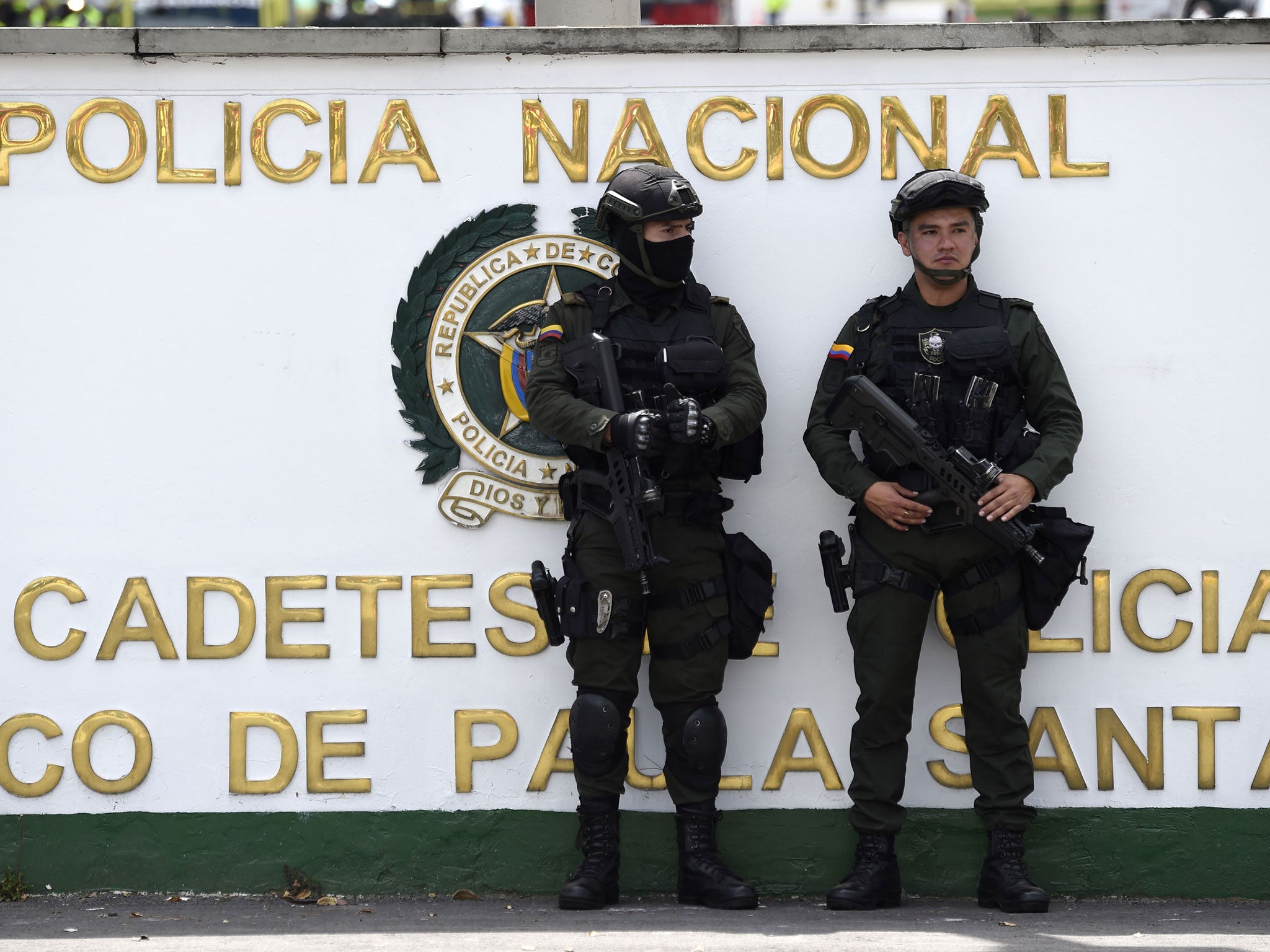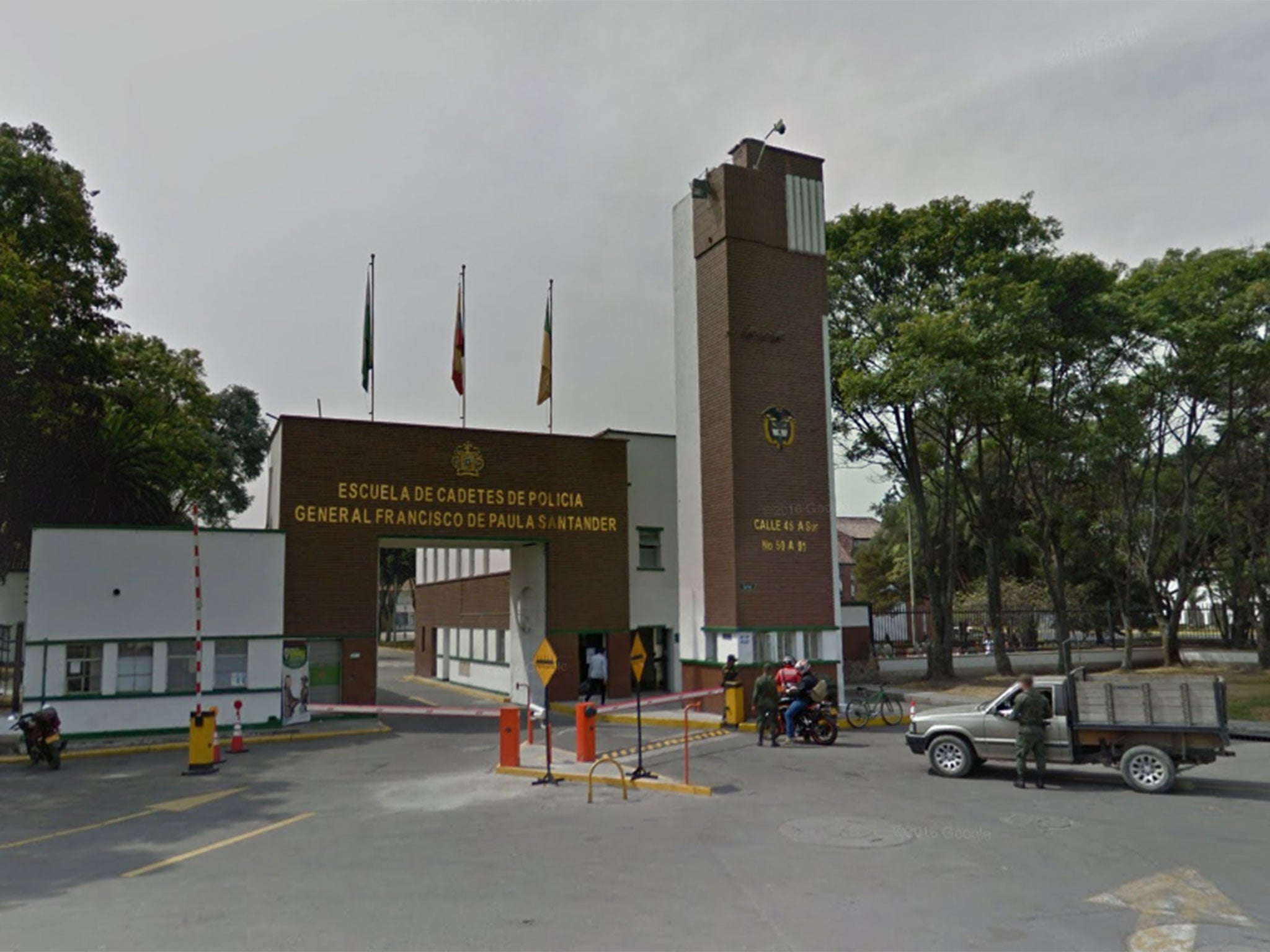Bogota explosion: Ten dead and dozens injured after car bomb attack at police station in Colombia capital
No-one yet claimed responsibility for deadly attack on police academy

Your support helps us to tell the story
From reproductive rights to climate change to Big Tech, The Independent is on the ground when the story is developing. Whether it's investigating the financials of Elon Musk's pro-Trump PAC or producing our latest documentary, 'The A Word', which shines a light on the American women fighting for reproductive rights, we know how important it is to parse out the facts from the messaging.
At such a critical moment in US history, we need reporters on the ground. Your donation allows us to keep sending journalists to speak to both sides of the story.
The Independent is trusted by Americans across the entire political spectrum. And unlike many other quality news outlets, we choose not to lock Americans out of our reporting and analysis with paywalls. We believe quality journalism should be available to everyone, paid for by those who can afford it.
Your support makes all the difference.At least ten people have been killed and dozens injured after a car bomb exploded at a police station in Bogota, Colombia's capital.
Ambulances and helicopters rushed to the General Santander national police academy, the normaly tightly-guarded target of the attack.
Images posted on social media showed a charred and burning vehicle surrounded by debris.
The police barracks buildings nearby are pockmarked with damage from the blast and have shattered windows.
The death toll, reported by the defence ministry, currently stands at ten, and the Bogota health ministry said a further 54 people were injured.
Residents of Bogota have been asked to donate blood at four points across the capital to help doctors treating the scores of wounded.
No-one has yet claimed responsibility for today’s bombing, but leftist rebels from the National Liberation Army (ELN) group have stepped up attacks on police in Colombia in recent months as peace talks with the president Ivan Duque have stalled.
Last week the ELN rejected Mr Duque’s demands for a unilateral ceasefire before negotiations in Havana resume.
The Cuban-inspired insurgency had been a minor player but stepped up its operations after the main guerilla group, FARC, disarmed in 2016.
Mr Duque, who had been visiting a western state of Colombia, announced shortly after the explosion he would be immediately returning to Bogota because of what he called an “miserable act of terrorism” against the police.

“All Colombians reject terrorism and are united in confronting it,” he tweeted, adding he had ordered every effort to be made to find the perpetrators and bring them to justice.
“Colombia is saddened but does not bow before this violence.”
Early investigations point to the possibility of a suicide bombing, which has never happened before during Colombia's decades of political violence.
The chief prosecutor Nestor Martinez said the attack was carried out by Jose Aldemar Rojas, a 56-year-old, who drive a Nissan pick-up packed with 80kg of pentolite high explosive.
After surveying the scene in person, Mr Duque said the bombing was an "attack against society" and a "demented terrorist act" which would not go unpunished.
Rafael Trujillo, whose son Gerson began training at the academy just two days ago, said he was on his way to deliver a package to Gerson when he heard the explosion just one block away.
"I'm sad and very worried because I don't have any information about my son," said Trujillo, standing outside the facility, where police officers had set up a taped perimeter.
"This reminds me of some very sad days in the past."
The United Nations peace mission in Colombia called it "an unacceptable criminal act which goes against the efforts the country is making to steer away from the violence, and work ... to build a more prosperous and peaceful future."
A national senator, Paola Holguin, tweeted images of the aftermath of the blast, offered her “solidarity” with the Colombian National Police and urged rejection of terrorism.

Local reports suggest the vehicle laden with explosives drove into the police academy at full speed before detonating.
Vice President Marta Lucia Ramirez told reporters it somehow managed to break through the security checkpoints which guarded the facility before blowing up.
It was not yet known how the vehicle, reportedly a pick-up truck, slipped through a gate which is permanently guarded by explosive-detecting sniffer dogs and armed security.
The identities of those killed has not yet been released, but it is known a Panamanian and Ecuadorian are among the dead.
During the worst of Colombia’s long battle against leftist rebels and drug cartels bombing attacks were not uncommon and often aimed at killing police officers.
But as the conflict has wound down in recent years and following the disarmament of FARC in 2016, security in Bogota has improved.
A year ago a wave of bombings against police stations along Colombia's Caribbean coast saw seven officers killed and dozens more injured in just 24 hours.
The last deadly bombing to hit Bogota was in June 2017, when an explosion in a upmarket shopping mall killed three people.
Join our commenting forum
Join thought-provoking conversations, follow other Independent readers and see their replies
Comments